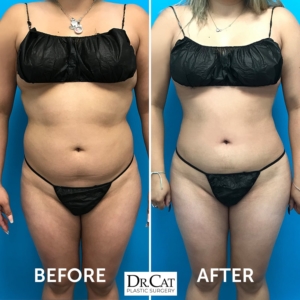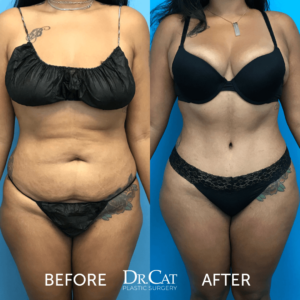What is the Best Diet after Liposuction?
The diet after liposuction is a common concern for patients. Many patients wonder if they gain or lose after surgery and what will happen to their results. The good news is many of the same healthy practices that are generally recommended for maintaining a healthy weight apply to maintaining the results of the procedure. Having a stable weight in the months leading up to and after a liposuction procedure ensures that positive results will be retained. And practicing the habits of a healthy lifestyle will be beneficial to maintaining a healthy weight while helping to prevent chronic illnesses and diseases. So these habits are good to adopt for many reasons beyond just maintaining the benefits of liposuction.
Should I lose weight before or after liposuction?
Liposuction is designed to help remove stubborn fat and contour the body by removing excess fat. It shouldn’t be seen as a weight-loss strategy and should never be used to lose significant quantities of weight. That said, patients should never try to crash diet or attempt to lose an extreme amount of weight in the months leading up to a liposuction procedure. Not only is this unhealthy, but without real lifestyle changes, the weight will most likely be gained back after the procedure. This can be extremely frustrating, which is why it’s better to learn a healthy weight loss strategy prior to considering liposuction.
Immediately after liposuction, swelling can cause the body to retain weight. But once the fat cells are removed, patients are often pleasantly surprised by the results months following the surgery.
How much weight should I lose before liposuction surgery?

It’s important for a patient to be in a healthy place where they are leading a lifestyle that supports maintaining a healthy weight. Liposuction isn’t a quick-fix weight-loss strategy. Patients can gain the weight back after liposuction, which is why it’s essential to develop healthy lifestyle strategies that support a healthy weight before undergoing a liposuction procedure.
Dr. Cat adds that you don’t need to be at your exact goal weight to enjoy the benefits of liposuction. “For many patients who just cannot lose the weight, surgery helps them feel better and usually kickstarts their healthy lifestyle. Many patients get surgery before they are at their goal weight.”
What should my diet be after a liposuction procedure?
Just after surgery, patients will want to take it easy and focus on allowing their body time to heal. A light, nutrient-rich diet packed with antioxidants and proteins assists with the healing process. Patients are given anti-nausea medication post-surgery. In the hours after surgery, it’s important, to begin with very light meals, like carbonated beverages and crackers. From there, patients can progress to normal meals. Since Dr. Cat removes significant amounts of fat through liposuction, it’s important to avoid fatty foods like fast food, which is counterproductive to maintaining a healthy weight.
What happens if I gain weight after liposuction?

What happens if I gain weight after liposuction with fat transfer?
Liposuction with fat transfer moves your own fat cells from one part of the body to contour and smooth another area with more fullness and youthful plumpness, such as the breasts and buttocks. Because your fat cells are transferred to another area of the body, Dr. Cat explains that the body contouring benefits should continue for years to come. “In addition to not having as many fat cells in the areas that were liposuctioned, the patient should proportionately gain more weight in the fat grafted areas since those areas house more fat cells now,” says Dr. Cat. “If the patient has fat transfer to the breasts or butt, they should gain the weight proportionally to these fat grafted areas.” That means you may benefit from the areas you want to be fuller being the areas where fat now gets stored.
What is the best diet plan to follow after liposuction?

- Don’t smoke and be conscious of alcohol consumption
- Drink 8-10 eight-ounce glasses of water every day
- Add more whole grains and lean proteins (like fish and legumes) to your diet
- Avoid excessive amounts of sugar (especially in liquid forms like soda, juice, and coffee drinks)
- Work on adding more fruits and vegetables to your meals
- Trim down portion sizes and eat smaller meals throughout the day
- Avoid a sedentary lifestyle and walk at least 15-20 minutes each day
With some basic diet and lifestyle changes, you can ensure that your liposuction results remain and are just the start of a healthy, fit lifestyle based on long-term health and wellness.
Book Your Liposuction in Beverly Hills
Dr. Cat is a liposuction specialist in Beverly Hills. Patients come from all over the US to take advantage of Dr. Cat’s artistic eye and skilled surgery technique. She is known for performing liposuction artistically, in a way that blends smoothly into surrounding areas to give patients seamless, natural-looking results. Contact Dr. Cat Plastic Surgery today to schedule a consultation to see if liposuction surgery can help you achieve your aesthetic goals.

